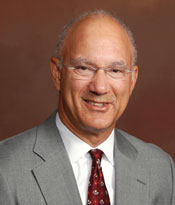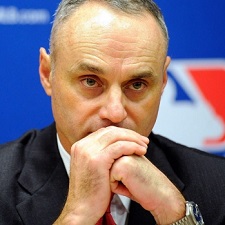MEDIA MAGNIFY MANFRED’S MINORITY MESS
Thursday, October 29th, 2015In recent months this website has been critical of Commissioner Rob Manfred for his farce of a program for minority hiring. While Manfred boasts of a desire and a plan to enhance minority hiring, he pushes the Milwaukee Brewers to hire a 30-year-old white guy, David Stearns, as their general manager, he oversees the naming of 15 white guys among a pool of 16 high-ranking executives and managers and he does nothing to secure even a solitary interview for De Jon Watson, the executive viewed as the most worthy minority candidate for the position of general manager.
I have previously made known my disdain for the commissioner’s empty efforts on behalf of blacks and Hispanics in their desire to achieve roles their white colleagues more easily attain. If Manfred genuinely wants to achieve equal treatment for blacks and Hispanics, he sure has a funny way of showing it.
In recent weeks, however, Manfred has been aided and abetted by members of the news media, who have ignored what he has done and even lauded him for what they see as an honorable effort to help minorities.
Before I get to that development, I want to update my scorecard on hiring of high-ranking executives and managers.
In the last four months teams have hired 14 high-ranking executives and two managers. Only one of those 16, general manager Al Avila of Detroit, is a minority. With two managing jobs open, the Dodgers could hire Gabe Kapler and the Marlins Don Mattingly, the scorecard would become 17 white guys and 1 Latino.
None of the columnists who have treated Manfred as they apparently think a commissioner should be treated have cited those figures. If they did, they would find that the figures compute to a .056 average. A batter with that average wouldn’t be welcome for long.
But Jon Heyman, for one, has nothing but praise for the commissioner, and he should know because he is, according to CBSports.com. the web site on which he appears, the Baseball Insider.
“MLB isn’t thrilled with the recent trend, but it also doesn’t blame the clubs,” Heyman wrote earlier this month, quoting Manfred as saying, “I am very comfortable that in each situation the club hired the person they felt was best suited for each job….I am concerned that we at Central Baseball have to do a better job.”
But does Heyman explain or ask Manfred why MLB isn’t doing a better job? Does he ask the commissioner why he pushed the Brewers to make Stearns their general manager (Stearns worked for Manfred in the commissioner’s office) but has not pushed any club to hire a minority as general manager?
He does not, even though he mentions Watson, a Diamondbacks’ executive, whom Heyman calls “highly respected” and asks “why shouldn’t Watson be a serious candidate anywhere?”
He should be, but unlike he did with Stearns, Manfred took no interest in Watson, who never worked for him.
The day before the start of the World Series Manfred held a news conference and the first questions were on the subject of minority hiring. They came from Ron Blum, an Associated Press reporter, and Michael Powell, a New York Times columnist.
I appreciate the fact that questions were asked, but they could have been more pointed and more challenging. One question could also have been better had it not suggested an answer for Manfred:
“Is it troublesome at all that next year could be the first year in decades with no black managers? And are more initiatives needed to get more candidates in the pipeline or is this just cyclical right now?”
“Well, first of all, I haven’t come to the conclusion that we’re going to get to next year with no black managers. It could happen.
“I do think that there is a certain cyclical nature to this. Obviously field managers are high turnover jobs. And you’re going to have peaks and valleys in terms of representation within what’s a very small sample; there’s only 30 of them out there.”
Cyclical? Peaks and valleys? Are white guys subject to cycles and peaks and valleys? I think not.
In reply to another question, Manfred said, “we are focused on the need to promote diversity, not just African American, but Latino, as well, in the managerial ranks. I am committed to what I’ve started to refer to as the “Selig Rule,” the interview requirement that Commissioner Selig originally imposed.”
 At the strong suggestion of Leonard Coleman, the National League president, Bud Selig imposed the minority-interview rule in 1999. As time went on, Selig became less stringent on enforcing the rule and allowed clubs to evade it with the flimsiest of excuses. Manfred has followed the latter Selig in his enforcement.
At the strong suggestion of Leonard Coleman, the National League president, Bud Selig imposed the minority-interview rule in 1999. As time went on, Selig became less stringent on enforcing the rule and allowed clubs to evade it with the flimsiest of excuses. Manfred has followed the latter Selig in his enforcement.
In the past month Manfred has winked at what to this outsider was an obvious scheme to elude the rule. He approved minority interviews by four different clubs with candidates who had no chance to get the jobs for which they were being interviewed.
Four unheralded, mid-level candidates being interviewed for four different jobs – stamp them sham interviews, but Manfred approved them and no reporter or columnist questioned his approval, sanctioning what appeared to be an obvious act to elude the minority-interview rule
“Look,” the commissioner said in another answer, “I believe that our clubs go out pursuant to the requirements that we’ve imposed. They make sure that there’s diversity in the candidates that they hire. And I really genuinely believe that they hire what they feel to be the most qualified person for the job. And that is the American way.
“What we need to do is make sure that we work very hard to have diverse candidates who turn out to be the most qualified person for the job. And we are committed to that undertaking. We’ve expanded the program significantly and will be talking to the owners about that program again in November.”
Reading the transcript of Manfred’s news conference, I couldn’t help but wonder if stuff like that is where the phrase “talk is cheap” came from.
Meanwhile, reading the Powell column in the Times, I couldn’t help but wonder which major league team has a black c.e.o. that Powell mentioned. Michael Hill of the Miami Marlins is the highest-ranking African-American in Major League Baseball, and his title, president of baseball operations, has some e’s and some o’s, but I don’t see a c.

 Commissioner Rob Manfred’s minority-hiring program for decision-making positions is working so well clubs can’t hire white guys fast enough. It’s as if part of Manfred’s policy includes a deadline after which clubs are not permitted to hire general managers or managers of the Caucasian persuasion.
Commissioner Rob Manfred’s minority-hiring program for decision-making positions is working so well clubs can’t hire white guys fast enough. It’s as if part of Manfred’s policy includes a deadline after which clubs are not permitted to hire general managers or managers of the Caucasian persuasion.

